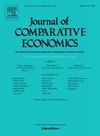The impact of black economic empowerment on the performance of listed firms in South Africa
IF 2.8
2区 经济学
Q1 ECONOMICS
引用次数: 0
Abstract
Black Economic Empowerment (BEE) is a policy that aims to empower previously disadvantaged individuals and decrease racial economic inequality in South Africa. As the program puts reformation pressure on firms, it might strongly influence firm performance. This article examines how BEE affects turnover, profits, and labour productivity of firms listed on the Johannesburg Stock Exchange (JSE). We use an extensive dataset covering a major share of listed firms between 2004 and 2019. The analysis employs fixed-effects regressions and the system GMM approach to account for endogeneity. Subsample analyses are used to account for heterogeneity in BEE scores. Overall, we find that BEE tends to have a small positive impact on firms’ turnover, a positive but not robust impact on labour productivity, and no impact on profits. Larger JSE-listed firms drive the positive effect on turnover. We conclude that BEE had a slightly positive effect on large JSE firms in the best case but also did not harm JSE firms in the worst case. To increase the benefits of BEE, we propose that the policy should be further adapted to reduce the cost of compliance and focus on areas that enhance structural change in South African companies, like skills development.
黑人经济赋权对南非上市公司绩效的影响
黑人经济赋权(BEE)是一项旨在赋予南非以前处于不利地位的个人权力并减少种族经济不平等的政策。由于该计划给企业带来了改革压力,因此有可能对企业业绩产生很大影响。本文考察了BEE如何影响在约翰内斯堡证券交易所(JSE)上市的公司的营业额、利润和劳动生产率。我们使用了一个广泛的数据集,涵盖了2004年至2019年期间上市公司的主要份额。分析采用固定效应回归和系统GMM方法来解释内生性。子样本分析用于解释BEE分数的异质性。总体而言,我们发现BEE倾向于对企业营业额有小的正向影响,对劳动生产率有积极但不强烈的影响,对利润没有影响。较大的日本证券交易所上市公司对营业额产生积极影响。我们得出结论,在最好的情况下,BEE对大型JSE公司有轻微的积极影响,但在最坏的情况下,也没有伤害JSE公司。为了提高BEE的效益,我们建议进一步调整政策,以降低合规成本,并将重点放在促进南非公司结构变革的领域,如技能发展。
本文章由计算机程序翻译,如有差异,请以英文原文为准。
求助全文
约1分钟内获得全文
求助全文
来源期刊

Journal of Comparative Economics
ECONOMICS-
CiteScore
4.40
自引率
0.00%
发文量
66
审稿时长
45 days
期刊介绍:
The mission of the Journal of Comparative Economics is to lead the new orientations of research in comparative economics. Before 1989, the core of comparative economics was the comparison of economic systems with in particular the economic analysis of socialism in its different forms. In the last fifteen years, the main focus of interest of comparative economists has been the transition from socialism to capitalism.
 求助内容:
求助内容: 应助结果提醒方式:
应助结果提醒方式:


